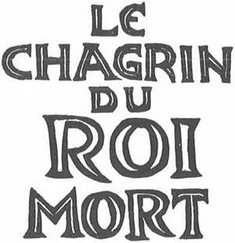Jean-Claude Mourlevat - Winter's End
Здесь есть возможность читать онлайн «Jean-Claude Mourlevat - Winter's End» весь текст электронной книги совершенно бесплатно (целиком полную версию без сокращений). В некоторых случаях можно слушать аудио, скачать через торрент в формате fb2 и присутствует краткое содержание. Год выпуска: 2010, ISBN: 2010, Издательство: Candlewick, Жанр: Старинная литература, на английском языке. Описание произведения, (предисловие) а так же отзывы посетителей доступны на портале библиотеки ЛибКат.
- Название:Winter's End
- Автор:
- Издательство:Candlewick
- Жанр:
- Год:2010
- ISBN:9780763651749
- Рейтинг книги:5 / 5. Голосов: 1
-
Избранное:Добавить в избранное
- Отзывы:
-
Ваша оценка:
- 100
- 1
- 2
- 3
- 4
- 5
Winter's End: краткое содержание, описание и аннотация
Предлагаем к чтению аннотацию, описание, краткое содержание или предисловие (зависит от того, что написал сам автор книги «Winter's End»). Если вы не нашли необходимую информацию о книге — напишите в комментариях, мы постараемся отыскать её.
Winter's End — читать онлайн бесплатно полную книгу (весь текст) целиком
Ниже представлен текст книги, разбитый по страницам. Система сохранения места последней прочитанной страницы, позволяет с удобством читать онлайн бесплатно книгу «Winter's End», без необходимости каждый раз заново искать на чём Вы остановились. Поставьте закладку, и сможете в любой момент перейти на страницу, на которой закончили чтение.
Интервал:
Закладка:
He beat the eggs vigorously, added salt and pepper, and slid the omelette into the pan, where the bacon was already sizzling. Then he went back to the living room, picked up the phone, and dialed a number.
“Is that the barracks? Mills here. Put Pastor on the line, would you? . . . Hi, Pastor, get the pack ready. No, not the full pack, five or six. The best. Yes, at once.”
A shape on the sagging sofa moved in the dim light.
“Hear that, Ramses? Going to enjoy this, are you?”
A strange head emerged from under a moth-eaten rug. The lower part of its face was elongated like a dog’s muzzle, but the rest of it was human: its eyes, its hairless skin, its flat skull covered with short hair.
“You heard that. You got it, right? We’re going hu-u-un-ting! Hu-u-un-ting!”
Mills lingered on the u sound, and then spat out the last syllable abruptly.
Ramses started whimpering and directed a still-sleepy eye on his master.
“Uuuu-in,” he laboriously articulated.
“Hunting!” Mills corrected him. “Hunting! Say it after me, Ramses: hunting.”
“Uuuu-in.”
“OK, Ramses, get dressed and join me in the kitchen.”
The omelette was ready. Mills slipped the whole thing into a soup plate that had been standing on the table since he ate his supper. He cut a huge chunk of bread and took the top off a tall bottle of beer. The aroma of the omelette and the prospect of the hunt delighted him. It struck him that life was a beautiful, simple thing when you made no particular demands on it. He began eating with a hearty appetite. Ramses, in a jacket and pants, sat down opposite him. He had done up the buttons of the jacket in the wrong holes, so that its front hung oddly. Mills felt slightly moved. Good old Ramses could always give him a laugh. But he’d never managed to teach any other dog-man to do up his own shoelaces!
“Eat? Want something to eat?”
“E-e-e-eee,” the creature replied, with a trickle of saliva running down his chops.
Mills pushed part of the omelette across the table to him and handed him a spoon.
“Here, and watch what you’re doing. Neat and clean, right? Neat and clean!”
Ramses laboriously stuck the spoon between the three fingers of his right hand, which had nails like claws, and concentrated on conveying a little food to his mouth.
They were finishing their meal when someone rang the doorbell. A thin, pale man was standing out on the landing, holding a travel bag.
“I’m a supervisor at the boys’ boarding school. I’ve come from Mr. Van Vlyck to bring you the —”
“Yes, I know,” Mills interrupted him. “Come in.” He led the man into the kitchen. “Sit down.”
The man gingerly perched on a corner of the chair. He never took his eyes off Ramses, and his hands were trembling.
“Forgive me, but this is the first time I ever . . . I’ve never seen a —”
“Never seen a dog-man before? Well, better take your chance now and have a good look. His name’s Ramses. Say hello, Ramses!”
“L-l-o-o-o!” the creature got out, twisting his mouth into a distorted smile that uncovered two rows of powerful teeth.
The man flinched so abruptly that he almost fell off his chair. Beads of sweat shone on his forehead.
“Right,” said Mills. “So show me what you’ve got there.”
The man opened his bag and took out a pair of leather boots.
“Here. They belong to the young man. I hope they’ll do. And for the girl, I’ve brought this.”
He dug into the bag again, and, still staring fixedly at Ramses, produced a scarf.
“She often wore it. We asked.”
“No perfume to mask the girl’s own odor?” asked Mills.
“I don’t think so,” replied the man warily, not daring to say for sure.
Mills took the scarf from his hands, buried his nose in it, and sniffed noisily.
“That’s OK. You can go.”
“Thank you,” the man mumbled. “Thank you and — er — good-bye, Mr. Mills.”
At the kitchen door, he turned. He was probably hoping to hear the dog-man’s disturbing voice again. The terror he had felt when Ramses uttered his inarticulate greeting a moment before told him to run for his life, but his fascination was stronger than his fear.
“And good-bye to you too, Mr. . . . er . . .” he repeated, to Ramses.
The dog-man didn’t move a muscle.
“Don’t bother!” said Mills. “He reacts only to my voice. And my orders.”
“Oh — oh, is that so?” faltered the man.
“Yes,” Mills replied. “For instance, if I tell him to attack you here and now, then you have twenty seconds to live, no more.”
“Twenty seconds — really?” said the man, choking.
“Just enough time for him to leap at your throat and virtually tear your head off your body.”
“My head off — my body?” the man repeated. He gave a small, nervous laugh and then slowly backed out into the corridor, followed by the gentle gaze of Ramses. Mills could hear his steps accelerating, the front door of the apartment slamming, and then the sound of his feet running downstairs.
There was still half a saucepan of black coffee left over from the evening before. Mills put it on the stove to warm up while he dressed. He didn’t wash; he never did before setting out on a hunt. Nor did he wash at any time during the hunt, even if it was likely to last for weeks. He didn’t shave either. The dirt that built up in the folds of his stomach and between his toes, the beard spreading over his face as if to consume it, all made him feel he was turning into an animal. When it was over and the prey was caught, he liked to go home, exhausted, filthy, and hungry, take a hot bath, and then spend three days eating and sleeping and never showing his face outdoors.
He put on his boots and a leather jacket, swallowed the coffee on his feet, and threw a few clothes, a pair of snowshoes, and a chunk of rye bread into an old canvas knapsack. As he left, he picked up the travel bag containing the boots and the scarf.
“Coming, Ramses? Let’s have fun!”
The two of them set off for the barracks through the night. The deserted roads echoed under their feet. The police chief went ahead. Ramses followed a little way behind him, walking upright. Like all dog-men, he could maintain a vertical posture without much difficulty, but he had the hunched shoulders and rounded neck typical of his kind, making him look like a hunchback. His arms seemed too short and too rigid, as if they had atrophied. “Stand up straight!” Mills often told him. Then Ramses would straighten his shoulders and put his head back, but next moment he had forgotten again.
Soon they were in the suburbs.
“Walk beside me!” ordered Mills. “You know I don’t like to have you following me. Anyone would think you were a farmyard dog snapping at my heels!”
Ramses came up level with his master, and they walked side by side for ten minutes. Then, gradually, the dog-man fell back until he was walking behind Mills again. Mills gave up. This was one of the things he couldn’t get Ramses to do, although when he’d taken him to live in his own apartment five years earlier he had cherished high hopes of this exceptionally gifted member of the pack.
Ramses was one of the third generation of dog-men in Mills’s service. The first generation, which he had inherited when he was appointed to his post, consisted of twenty animals — or twenty men, whichever you preferred — who had been given the names of stars. The second generation, ten years later, bore the names of Roman emperors: Caesar, Nero, Octavius, Caligula. The third was named after ancient Egyptian pharaohs: Chephren, Teti, Ptolemy, and so on. Thus Ramses was the son of Augustus and Flavia, and the brother of Cheops and Amenophis. Mills had quickly seen the remarkable potential of the big dog-man with the dreamy look in his eyes, and one day it gave him the idea of adopting Ramses and keeping him in his own bachelor apartment.
Читать дальшеИнтервал:
Закладка:
Похожие книги на «Winter's End»
Представляем Вашему вниманию похожие книги на «Winter's End» списком для выбора. Мы отобрали схожую по названию и смыслу литературу в надежде предоставить читателям больше вариантов отыскать новые, интересные, ещё непрочитанные произведения.
Обсуждение, отзывы о книге «Winter's End» и просто собственные мнения читателей. Оставьте ваши комментарии, напишите, что Вы думаете о произведении, его смысле или главных героях. Укажите что конкретно понравилось, а что нет, и почему Вы так считаете.












